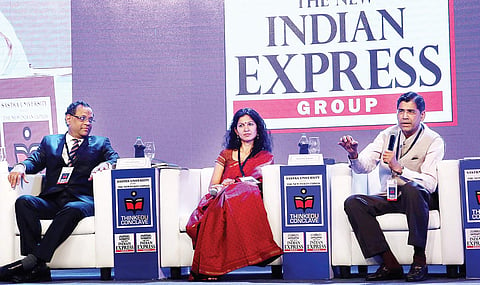

CHENNAI: A few decades ago, law was a career option only if one failed to get into medicine or engineering. However, today, to get into a good law university, students have to participate in competitive exams, which is a welcome change, said prominent lawyers Arvind P Datar, senior advocate at the Madras High Court, and N Venkatraman, senior advocate at the Supreme Court, while participating in a discussion at the ThinkEdu Conclave on whether India was producing world-class lawyers.
“We do have world-class lawyers but we don’t have enough of them,” Datar said. He suggested three ways to improve the standard of law schools. “There was a time when there would only be a handful of law colleges and universities in the country. Today almost every State wants a national school, but we should remember that with quantity, quality always suffers. We need to stop allowing colleges from mushrooming,” said Datar. His second recommendation was to shut down incompetent colleges in the country.
The third suggestion Datar made was for law colleges to have part-time lecturers, who also practise law at the same time and are not full-time academicians. “In Mumbai, the law school was right next to the court and the classes would start at 7 and end at 10, after which the lawyers would go to practice. We need to have that kind of system in our law universities again. Students need to learn about the real experiences,” he explained.
Venkatraman agreed with his colleague, also adding that it was essential for law students to start spending more time in courts. “Three-four week internships don’t really benefit, students should undergo at least a 90-day internship, so they know what awaits them,” he observed.
"Law courses like medicine have to be 50 per cent academics and 50 per cent experience. Also, we should not burden these students by forcing them to study 35 subjects, we have to allow them the freedom to choose what they want to study,” Venkatraman said. He added that law schools should begin to have the open-book system because eventually what mattered was the enhancement of skill and not academic grades.
Both the advocates and members of the audience also threw light on the advantages of live streaming or video-graphing court proceedings, not just for the benefit of law students but also public.
However, does producing world class lawyers only stop at imparting knowledge of theories or teaching students about the skill to win a case, questioned Jayna Kothari, executive director of Centre for Law and Policy Research. Ultimately there were four options for a law graduate – corporate employment, litigation, study and research and finally, social activism.
Speaking on this aspect, Kothari said, “Most students choose to go into corporate law because it is more lucrative and that is okay but are our law schools teaching students about social justice, do they know that most of the poor cannot access courts, that they cannot afford lawyers? Why do we have so few lawyers going into legal aid? Are our law schools addressing these social issues?”
She suggested that law schools should invest more time in our budding lawyers to make them aware of these problems and encouraging them to volunteer and help deliver justice in such situations.